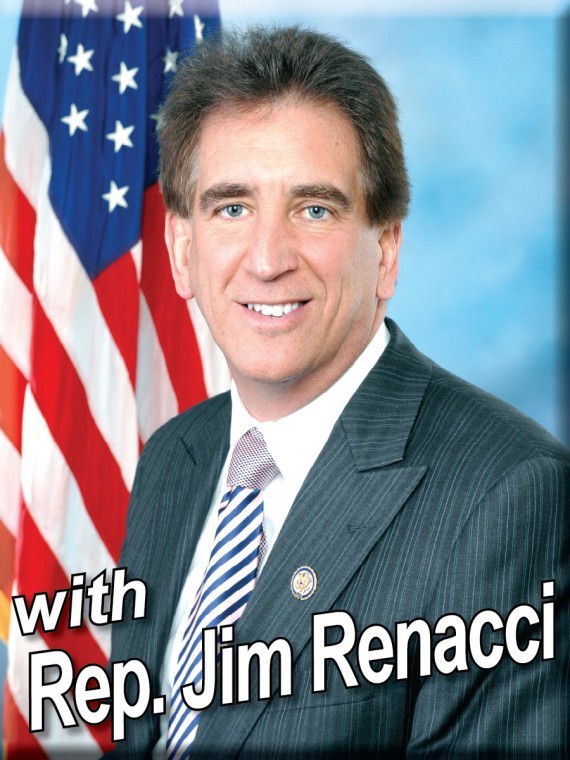A moment with the Congressman
Officers, first responders deserve recognition
Last week, the White House celebrated American Heroes Week, a week in which the administration highlighted and honored the service and sacrifice of American heroes such as our law enforcement officers and first responders. As I travel across the 16th District, I am routinely reminded of the sacrifices made by these individuals. Every day, these men and women across our district put their lives on the line to protect our communities and fellow citizens, and some will make the ultimate sacrifice, losing their life in the line of duty. That is why I am proud to be co-sponsoring legislation in Congress to recognize their service and provide them with the benefits and assistance they need. Earlier this year, I co-sponsored the Honoring Hometown Heroes Act. This bipartisan legislation would amend our nation’s flag code to allow governors to order the flags of their state to be flown at half-staff in recognition of public safety officers and first responders who died serving their communities. These individuals deserve to be recognized, honored and remembered for their sacrifice. This bill enables everyday Americans to demonstrate their gratitude and respect for these men and women who placed themselves in harm’s way for our safety. While we can never truly repay them for their sacrifice, our flag code is a reflection of our priorities and values as a people. Amending the flag code to reflect our deepest respect for our hometown heroes is an appropriate and merited expression of our gratitude. I was pleased to see the Honoring Hometown Heroes Act passed the House of Representatives with overwhelming bipartisan support in May.
I am also co-sponsoring the Firefighter Cancer Registry Act. Research shows that firefighters have a higher rate of many types of cancer than the general population, most likely due to their exposure to asbestos and other chemical fumes as they combat fires. This legislation would require the CDC to develop and maintain a voluntary registry of firefighters with cancer. Through this database, the CDC would collect occupational information such as the number of years a firefighter worked, the number of fire incidences they responded to and more – to delineate any relationships between a firefighter’s service and their cancer risk. Once equipped with this data, we can develop better protective equipment and cancer prevention techniques for our firefighters. Having served as a volunteer firefighter for four years after moving to Wadsworth, I understand the challenges and dangers these men and women encounter in their work. It is of the utmost importance we ensure that their bravery does not expose them to any unnecessary risks.
Additionally, I am a co-sponsor of the Volunteer Responder Incentive Protection Act. Let’s face it. Being a first responder or law enforcement officer isn’t for everyone. It takes a lot of guts to put yourself in danger. That’s why many state and local governments often rely on volunteers to help out and offer financial incentives to recruit and keep them. In 2012, 69 percent of all firefighters were volunteers according to the National Fire Protection Association. The Volunteer Responder Incentive Protection Act would exempt any property tax benefit and any other type of benefit up to $600 in value per year from a person’s federal income tax liability. By passing this legislation, Congress would make it easier for our local communities to recruit and retain individuals who volunteer to keep us safe.
Our first responders’ courage and skills represent the best of who we are as Americans. Law enforcement officers and first responders work tirelessly for our communities, and I am proud to support them.
I am also co-sponsoring the Firefighter Cancer Registry Act. Research shows that firefighters have a higher rate of many types of cancer than the general population, most likely due to their exposure to asbestos and other chemical fumes as they combat fires. This legislation would require the CDC to develop and maintain a voluntary registry of firefighters with cancer. Through this database, the CDC would collect occupational information such as the number of years a firefighter worked, the number of fire incidences they responded to and more – to delineate any relationships between a firefighter’s service and their cancer risk. Once equipped with this data, we can develop better protective equipment and cancer prevention techniques for our firefighters. Having served as a volunteer firefighter for four years after moving to Wadsworth, I understand the challenges and dangers these men and women encounter in their work. It is of the utmost importance we ensure that their bravery does not expose them to any unnecessary risks.
Additionally, I am a co-sponsor of the Volunteer Responder Incentive Protection Act. Let’s face it. Being a first responder or law enforcement officer isn’t for everyone. It takes a lot of guts to put yourself in danger. That’s why many state and local governments often rely on volunteers to help out and offer financial incentives to recruit and keep them. In 2012, 69 percent of all firefighters were volunteers according to the National Fire Protection Association. The Volunteer Responder Incentive Protection Act would exempt any property tax benefit and any other type of benefit up to $600 in value per year from a person’s federal income tax liability. By passing this legislation, Congress would make it easier for our local communities to recruit and retain individuals who volunteer to keep us safe.
Our first responders’ courage and skills represent the best of who we are as Americans. Law enforcement officers and first responders work tirelessly for our communities, and I am proud to support them.
